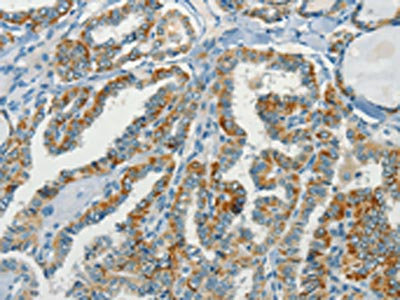NPAP1 Antibody
-
货号:CSB-PA220876
-
规格:¥1100
-
图片:
-
其他:
产品详情
-
Uniprot No.:Q9NZP6
-
基因名:NPAP1
-
别名:NPAP1 antibody; C15orf2Nuclear pore-associated protein 1 antibody
-
宿主:Rabbit
-
反应种属:Human
-
免疫原:Synthetic peptide of Human NPAP1
-
免疫原种属:Homo sapiens (Human)
-
标记方式:Non-conjugated
-
抗体亚型:IgG
-
纯化方式:Antigen affinity purification
-
浓度:It differs from different batches. Please contact us to confirm it.
-
保存缓冲液:-20°C, pH7.4 PBS, 0.05% NaN3, 40% Glycerol
-
产品提供形式:Liquid
-
应用范围:ELISA,IHC
-
推荐稀释比:
Application Recommended Dilution ELISA 1:1000-1:5000 IHC 1:50-1:200 -
Protocols:
-
储存条件:Upon receipt, store at -20°C or -80°C. Avoid repeated freeze.
-
货期:Basically, we can dispatch the products out in 1-3 working days after receiving your orders. Delivery time maybe differs from different purchasing way or location, please kindly consult your local distributors for specific delivery time.
相关产品
靶点详情
-
功能:May be involved in spermatogenesis.
-
基因功能参考文献:
- NPAP1 is specific to primate species and absent from the 15q11q13-orthologous regions in all nonprimate mammals. PMID: 24482533
- C15orf2 is part of the nuclear pore complex or its associated molecular networks. PMID: 22694955
- C15orf2 gene is imprinted, with monoallelic expression from the paternal allele in fetal brain. PMID: 17337158
- These results indicate that C15orf2 might have an important role in human biology and that a deficiency of C15orf2 might contribute to Prader-Willi syndrome. PMID: 20020165
- The results from this study show an involvement of microdeletions at 15q11.2 that predispose patients to idiopathic generalized epilepsies. PMID: 19843651
显示更多
收起更多
-
亚细胞定位:Nucleus, nucleoplasm. Nucleus inner membrane. Note=Colocalizes with the NPC and nuclear lamins at the nuclear periphery.
-
组织特异性:Testis-specific in adults. In fetal brain expressed only from the paternal allele.
-
数据库链接:
HGNC: 1190
OMIM: 610922
KEGG: hsa:23742
STRING: 9606.ENSP00000333735
UniGene: Hs.649663
Most popular with customers
-
-
YWHAB Recombinant Monoclonal Antibody
Applications: ELISA, WB, IF, FC
Species Reactivity: Human, Mouse, Rat
-
-
-
-
-
-





















